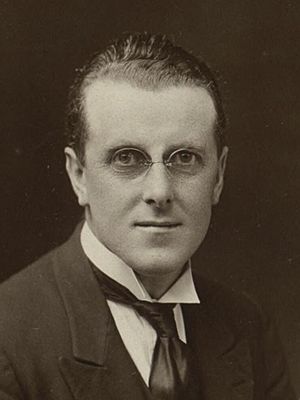R. Williams Parry facts for kids
Quick facts for kids
Robert Williams Parry
|
|
|---|---|
 |
|
| Born | 6 March 1884 Tal-y-sarn, Gwynedd, Wales
|
| Died | 4 January 1956 (aged 71) Bethesda, Gwynedd, Wales
|
Robert Williams Parry (born March 6, 1884 – died January 4, 1956) was a very important Welsh poet. He wrote in the Welsh language during the 20th century. Many people consider him one of the best poets from Wales.
Contents
Who Was Robert Williams Parry?
Robert Williams Parry was born in a place called Tal-y-sarn in Dyffryn Nantlle, Wales. He had two famous cousins who were also writers: T. H. Parry-Williams and Sir Thomas Parry.
Robert Williams Parry's Education Journey
Robert Williams Parry started his schooling at Tal-y-sarn elementary school. Later, he went to Caernarfon county school from 1896 to 1898. He also spent a year at the new Pen-y-groes county school. From 1899 to 1902, he worked as a pupil-teacher.
He then went to University College of Wales, Aberystwyth, from 1902 to 1904. There, he started his degree and trained to be a teacher. After teaching at different schools until 1907, he finished his degree at the University College of North Wales, Bangor.
Robert Williams Parry's Career and Life
From 1908 to 1910, Robert Williams Parry taught Welsh and English at Llanberis county school. He went back to college in Bangor and spent some months in Brittany. He was working on his MA degree, which he received in 1912. His research was about how the Welsh and Breton languages were similar.
After that, he continued teaching. He taught at Cefnddwysarn and then at Barry county school. In 1916, he became the English master at Cardiff High School for Boys.
Parry served in the army from 1916 to 1918. After leaving the army, he returned to Cardiff. In 1921, he became the headmaster of Oakley Park School in Montgomeryshire. He left this job in early 1922. He was then appointed a lecturer at the university college in Bangor. He worked in the Welsh and Extra-Mural Studies Departments. He stayed there until he retired in 1944. After he got married in 1923, he lived in Bethesda, Gwynedd.
Robert Williams Parry's Poetry
Robert Williams Parry became well-known as a poet in 1910. He won the top prize, called the chair, at the National Eisteddfod. This was for his poem "Yr Haf," which means 'The Summer'. People have called this poem "the best known and admired" of all the Eisteddfod poems from the 20th century.
He published two collections of his poems. The first was Yr Haf a cherddi eraill in 1924. The second was Cerddi'r Gaeaf in 1952.
Famous Poems by Robert Williams Parry
Some of his most famous poems include "Y Llwynog" ('The Fox') and "Eifionydd". He also wrote "Englynion coffa Hedd Wyn". In this poem, he used a traditional Welsh four-line verse form called an englyn. He also used a special poetic technique called cynghanedd. He wrote this poem to remember the poet Ellis Humphrey Evans. Hedd Wyn died in a battle during World War I in 1917. He was given the Eisteddfod chair after he died.
Parry wrote about Hedd Wyn's empty chair:
- "The chair ... today stretching out its arms in a long peace of silence for the one who hasn't come."
You can find a good short story and review of Parry's work. His cousin, Sir Thomas Parry, wrote it in the Dictionary of Welsh Biography.
Images for kids
-
A llonydd gorffenedig/ Yw llonydd y Lôn Goed
The peace of Lôn Goed Is perfect peace (Verse from the poem "Eifionydd" on a sign in Gwynedd.
 | Sharif Bey |
 | Hale Woodruff |
 | Richmond Barthé |
 | Purvis Young |


